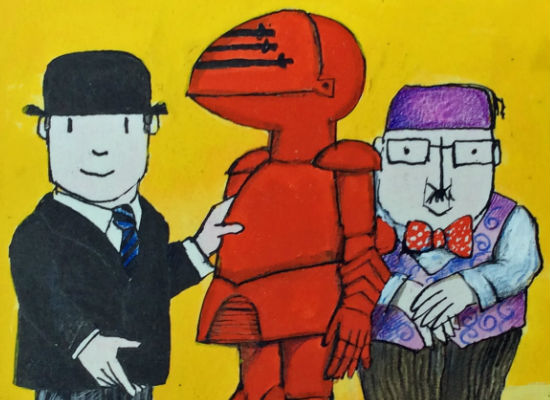
Supposedly the much-revered ancient Greek philosopher Aristotle once said “Give me a child until he is 7 and I will show you the man”.
While it’s not absolutely true, of course, since life is way too messy and cruel sometimes to keep that 7-year-old in absolutely pristine condition, there is a enough truth in that age-old observation to warrant the quote’s repetition over and over again.
In my case, it’s very relevant with the TV-obsessed 7-year-old I was in 1973 becoming the TV-obsessed 51-year-old adult of 2017.
One of the TV shows that played a significant role in helping me to appreciate and love the way television could tell a pithy, well-wrought story was the classic BBC animated program for kids, Mr Benn.
Broadcast by the BBC in 1971 and 1972, the 14-episode series, created, written and animated (with Ian Lawless) by David McKee, with warmly conversational narration by Ray Brooks – 13 episodes were transmitted in the early ’70s, with the 14th “Gladiator” only making an appearance in 2005 on The Noggin Channel – was an enchanting diversions for me.
There was an enthralling wonder to every episode with the eponymous Mr Benn of 52 Festive Road, which was always described as very ordinary, taken on a magical journey to far-off kingdoms, outer space, jungles and prehistoric times and even the wild, wild west, all courtesy of a mysterious fancy-dress costume shop located in a small off-the-grid lane.
The proprietor of the shop, a mustachioed, fex-wearing man who always appeared out of nowhere,always happily let Mr Benn try on any costume he liked, before our intrepid explorer walked out the end of the change room into an exciting adventure of some kind.
The stories always had a gentle morality tale quality to them such as environmental concerns or respecting someone’s word and not listening to scurrilous talk about them but it was never heavy-handed, and each episode ended with the shopkeeper appearing again, ushering Mr Benn back to the change room and sending him with a memento of his trip out of the ordinary and the mundane.
As David KcKee told The Guardian recently, the object of each episode, all of which followed the same reassuring and delightfully repetitive pattern, was to provide an escape but too much of one for viewers:
“I wanted to write a story about Mr Everybody. Everyone is trapped in a situation … we all have that routine and the adventures were an escape from routine.
“Of course, in some ways we don’t want to escape. There is the security of routine but to escape and have a little adventure every now and again might be quite nice.”
You might not think that a 7-year-old boy would have much need of an kind of escape, but teased almost from the moment I went to school because I didn’t fit the notion of masculinity that even first graders seemed to have hardwired into them (yeah, I never got that memo), I most certainly needed to get away and get away often.
Of course I had my own imagination to draw on, but beyond that, the episodes of Mr Benn, whose then 13-episodes were repeated twice a year for 21 years by the BBC – this requirement meant that a Father Christmas episode never made the cut, a pity since I love Christmas and would have welcome a festive escape from Festive Road – and whose deliberately simple but charming animation is a pleasure to watch even as an adult many years later, proved a lifesaver for a young boy for whom reality was not always kind.
The good news is that universality of needing an escape from the everyday but not one that places that everydayness in jeopardy, is still as current today with an exhibition in London at The Illustration Cupboard gallery (it finishes today) and a mooted movie (first raised and discarded in 1999 but back on the drawing board) and even an opera keeping the Mr Benn love alive.
What was so distinctive about Mr Benn, and what no doubt keeps him in the public consciousness even today, is that all his adventures, no matter how magical they were, actually happened and weren’t just dreams, a particularly important facet of the storytelling according to McKee:
“I never liked stories that ended up as dreams. I never liked the character having a fantastic adventure and on the last page it was ‘Come along, John, and John realised it had all been a dream.’ What a cheat!” (The Guardian)
And in the end, what would have been the point for a show like that?
Granted I never found a fancy-dress costume shop that took me on grandly epic adventures to all kinds of places and times just by putting on a costume, but the idea that I could, that it could maybe, possible, really happen?
Ah know, that was the beguiling promise from Mr Benn that got me through childhood, and reminds every day as an adult that finding the magic in the everyday is something we owe yourselves to find whenever we can.
